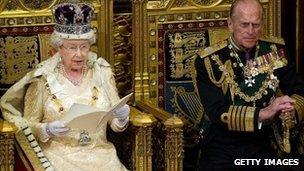Queen's Speech: Changes to exams, curriculum and teachers' pay highlighted
- Published

The Queen set out the government's priorities
Wide-ranging changes to the exam system, the national curriculum and teachers' pay in England have been confirmed in the Queen's Speech.
Some exam changes, such as the end of modular GCSEs, have already been brought in and more are planned.
Teachers' pay will be more closely linked to performance.
And a new national curriculum is planned from 2014, which will apply to state-funded schools that are not academies.
As semi-independent schools, academies have the freedom to set their own curriculum.
Ministers say the curriculum will be slimmed down, but there will be "detailed programmes of study" for English, maths and science that will set out the "core knowledge" expected.
Other subjects will have looser guidance, focusing "only on the essential knowledge to be taught".
A key change will be that it will be compulsory for pupils in the older years of primary school to learn a language.
The government has confirmed schools will be free not to follow most of the existing curriculum for the next academic year, "to give schools greater flexibility to prepare to teach the new national curriculum".
State schools will still have to teach national curriculum subjects, but not the detailed programmes of study, except for the last two years of primary school.
In Parliament, the Queen said: "My government will take forward plans for a new curriculum.
"My government will also take forward plans for a world-class exam system."
Extended writing
Changes to GCSE exams are already under way, with the ending of modular exams so that exams will be taken after two years of study, rather than in "chunks" over two years.
Opportunities for re-sits have been cut.
Specific marks are being allocated for good spelling, punctuation and grammar - a change that affects exams in English literature, geography, history and religious studies taken since January this year.
New GCSEs will be taught in certain key subjects from September 2015, which the government says will be linear (exams taken at the end), with less controlled assessment (coursework) and more emphasis on "extended writing" rather than "bite-sized questions".
Changes to A-levels also involve a move to exams being taken at the end of two years' study, with the first new A-levels in certain key subjects due to be taught in schools and colleges from September 2015.
Teaching unions oppose many of the changes being brought in.
Christine Blower, general secretary of the National Union of Teachers, said: "The government proposals on reforms to the national curriculum, examinations and the deregulation of teachers' pay are ill thought out and plain wrong.
"They will certainly not ensure a world class education system."
A spokeswoman for the Department for Education said the government was "reforming the education system so that it is on a par with the world's best".
The changes it was bringing in would help students get a "real understanding of a subject and gain qualifications that command the respect of the best universities and employers", she added.
- Published8 May 2013
- Published7 May 2013
- Published25 April 2013
- Published7 February 2013
- Published7 February 2013
- Published23 August 2012
- Published7 February 2013
- Published27 February 2013
- Published7 February 2013
- Published31 March 2013